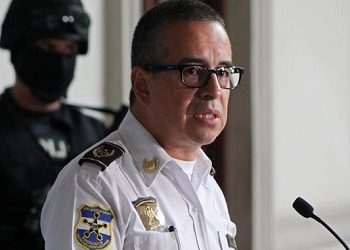El Salvador Police Chief Howard Cotto warned that gangs plan to infiltrate local politics by involving themselves in municipal elections, echoing the findings of InSight Crime’s investigative series examining the criminal ties of mayors in Central America’s Northern Triangle.
During a television interview on October 30, Cotto said that gangs are currently attempting to “infiltrate” politics ahead of the country’s March 2018 legislative and municipal elections, reported La Prensa Gráfica.
The official explained that gangs offer municipal candidates votes or reductions in violence in exchange for municipal jobs or other benefits for their members. According to Cotto, periods of spiking homicides this year are the result of gangs setting the stage for negotiations with candidates.
Once the elections have passed and friendly candidates occupy city hall, the gangs have leverage over these officials.
“The problem is that there are municipal governments that are seeking something in exchange for this. The candidate can negotiate with the gangs, always looking to future electoral campaigns,” Cotto said.
“This is how a gang finds a breach into a town hall that can eventually open up to the gang taking control of the municipality,” the police chief stated in comments reported by La Página.
This is not the first time that Cotto has publicly warned of negotiations and deals between local candidates and gangs. Earlier this month, he said that gangs “flirt” with politicians in order to get them to reduce anti-gang security measures “both in and out of prisons,” according to El Mundo.
InSight Crime Analysis
Cotto’s comments are a reminder that mayors often serve as a nexus of crime and political power throughout Central America, as InSight Crime has detailed in recently published investigations carried out in Guatemala and Honduras.
The relationship between gangs and politicians is mutually beneficial by nature; the gang expands or maintains its influence over a certain area, while the politician gains or maintains local power. This partly explains why this dynamic is frequently observed in El Salvador.
SEE ALSO: InDepth Coverage of Gangs
But while the police chief’s comments focused on illicit ties at the municipal level, this type of mutually beneficial relationship has also been observed in national politics.
Several videos have shown El Salvador’s two main political parties, the Farabundo Martí National Liberation Front (Frente Farabundo Martí para la Liberación Nacional – FMLN) and Nationalist Republican Alliance (Alianza Republicana Nacionalista – ARENA), agreeing to pay gangs millions of dollars in exchange for support during the country’s last presidential elections in 2014.
These links with politicians of all levels have prompted some observers to portray criminal organizations as political actors akin to more traditional special interest groups.

